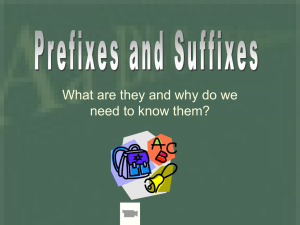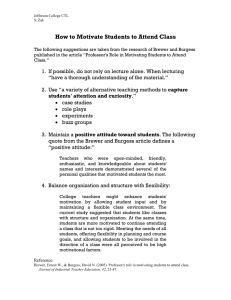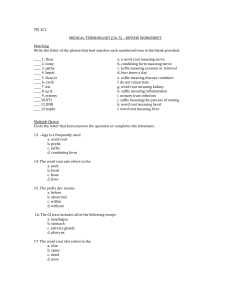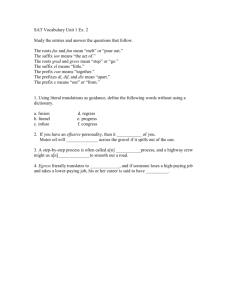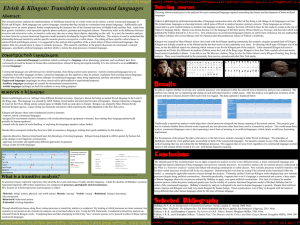Artificial Languages
advertisement
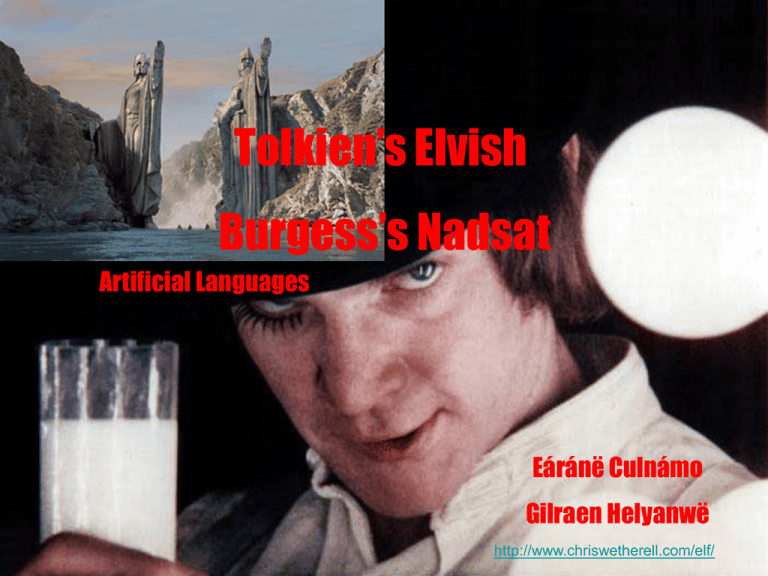
Tolkien’s Elvish Burgess’s Nadsat Artificial Languages Eáránë Culnámo Gilraen Helyanwë http://www.chriswetherell.com/elf/ Artifical Language • An artifical language is created by the conscious formualtion of its phonology, grammar, and/or vocabulary, rather than by evolving naturally. • Why create a language? - To assist communication - Linguistic experimentation - As a game between a group of people - To bring a fictional world to life. Elvish vs. Nadsat Tolkien’s Elvish has a complete phonological and grammatical system. Burgess’s Nadsat concentrates solely on vocabulary. This allows them to accomplish different things in their fictional worlds. Tolkien is able to establish a complete Elvish culture in his books, while Burgess is able to incorporate his language in a way that is accessible to readers. J.R.R Tolkien • "I was from early days grieved by the poverty of my own beloved country: it had no stories of its own, not of the quality that I sought, and found in legends of other lands. There was Greek, and Celtic, and Romance, Germanic, Scandinavian, and Finnish, but nothing English, save impoverished chapbook stuff." • Language embodies culture, which Tolkien was trying to create. The Tengwar • The Quenya alphabet. • These letters indicate only consonants. • Vowels are shown with marks made above the preceding consonant. • If there is no preceding consonant, the mark is made above a carrier. Namárië (Farewell) Ai! laurië lantar lassi súrinen, yéni únótimë ve rámar aldaron Yéni ve lintë yuldar avánier mi oromardi lissë-miruvóreva Andúnë pella, Vardo tellumar nu luini yassen tintilar i elen ómaryo airetári-lírinen. Sí man i yulma nin enquantuva? An sí Tintallë Varda Oiolossëo ve fanyar máryat Elentári ortanë ar ilyë tier undulávë lumbulë ar sindanóriello caita mornië i falmalinnar imbë met, ar hísië untúpa Calaciryo míri oialë. Sí vanwa ná, Rómello vanwa, Valimar! Namárië! Nai hiruvalyë Valimar! Nai elyë hiruva! Namárië! http://www.youtube.com/wa tch?v=6de_SbVUVfA Making Words Plural Ai! laurië lantar lassi súrinen Ah! like gold fall the leaves in the wind Words are made plural by adding “r” or “i” “i” is used after a consonant or in place of a final “e” Lanta = to fall Lasse = leaf Verb Tenses Sí man i yulma nin enquantuva? Who now shall refill the cup for me? Present Tense: subject pronoun suffix added. No suffix is used for 3rd person singular. Ex: enquanta = He refills. Perfect past: -nie suffix. Ex: enquantanie = He has refilled. Imperfect past: -ne suffix Ex: enquantane = He refilled. Future Tense= -uva suffix Ex. enqantuva = He shall refill. Word Formation ar hísië untúpa Calaciryo míri oialë. and mist covers the jewels of Calacirya for ever. Quenya has numerous prefixes and suffixes to modify words, and thus create new words. The suffix for intensifying a word is – (a)le. Oia = always. Oialë = forever. The suffix for diminshing words is – lle. Oialle = almost always; sometimes. Other prefixes and suffixes can change the meaning of words or their parts of speech. Syntax ar ilyë tier undulávë lumbulë and all paths are drowned deep in shadow ar =and ilya = all tie = path undulave = drown lumbe = shadow Syntax Sí man i yulma nin enquantuva? Who now shall refill the cup for me? Now who the cup for me shall refill? Sí vanwa ná, Rómello vanwa, Valimar! Now lost, lost to those of the East is Valimar! Now lost to, those of the east lost, Valimar! Integrate Elvish into Your Lifestyle (We’re not kidding) A Few Elven Insults 1. Much wind pours from your mouth. Antolle ulua sulrim / αntolə uluə sulrim/ Elven Insults 2. You are king in your imagination. Lle naa haran e’ nausalle /lə nα hαrαn ε nαhusαlə/ 3. You smell like a human. Lle holma ve’ edan /lə holmα vε edαn/ And now… something slightly less nerdy (but not by much)… NADSAT created by Anthony Burgess for the novel A Clockwork Orange “nadsat” means “-teen” in Russian Language of the Teenagers! Burgess=Burgeoning Genius • A Clockwork Orange written in 1962 • Adapted into film by Stanley Kubrick • Teenagers rule the world? • Sex, violence… and SLANG! Nadsat • • • • • “Teen vocabulary of the future” Capturing the vernacular of a sub-culture 250+ words Folk etymology? Influences – Russian – Cockney rhyming slang! – English • Associations • Amputations • Combinations Comprehensible… “You could viddy that poor old Dim the dim didn’t quite pony all that, but he said nothing for fear of being called gloopy and a domeless wonderboy.” Russian Influences Burgess uses Russian loanwords ingeniously transformed or analogized • • • • • “Biblio”: biblioteka, library “Gulliver”: golova, head “Horrorshow”: khorosho, good or well “Millicents”: militsia, militia or police “Rozz”: rozha means grimace; Alex uses it to mean police • “Neezhnies”: neezhny means lower; Alex uses it to mean underpants Other Influences Cockney rhyming slang “hound-and-horny”: corny Associations “cancer”: cigarette Transformations “appy polly loggy”: apology Amputations “sarky”: sarcastic “sinny”: cinema Combinations chatter + mumble = “chumble” mouth + munch = “mounch” Words You Might’ve Guessed • Em=Mom • Pee=Father • Fagged=Tired • Prod=To produce • Guff=Laugh • Sarky=Sarcastic • Horn=To Cry Out • Snuff It=To Die • In-out-in-out=Sex • Warble=Song Language as Identity • What does it mean that Burgess gives his violent, teenage protagonist his own language, which is only spoken among his other violent, teenage friends? • How does slang improve/deteriorate a language? Deciphering from Context… “And then in the afterlunch I might perhaps, if I still felt like it, itty off to the old skolliwoll and see what was vareeting in that great seat of gloopy useless learning” (35). Farewell… My heart shall weep until it sees thee again Cormamin niuve tenna' ta elea lle au’ May the leaves of your life tree never turn brown Aa' lasser en lle coia orn n' omenta gurtha
